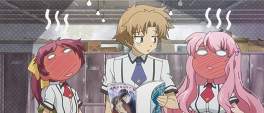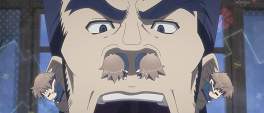Like fruit, Baka to Test to Shokanju ripens with age. The running gags taste increasingly better and the variety keeps each one appetising; then the final pair of episodes roll around focusing entirely of the series' namesake and without warning there is oatmeal where fruit once was. The cross-up from raucous shenanigans to a poignant David and Goliath type story had been brewing throughout, however it isn't where the series strength lies. Quick-fire jokes, parodies and taboo-shattering characters - whether it is the aggressively homosexual Miharu, the gender bending Hideyoshi or the domineering Shoko - all blend together to create a hot-pot of outrageous hilarity and one of the most potent comedies of recent memory, regardless of its conclusion.
Fumizuki Academy isn't like other schools: instead of teaching all students equally, they are segregated into classes based on their skill. At the entrance exam, Mizuki Himeji is taken ill and scores zero, relegating her to the bottom of the school: Class F. Stuck with decrepit equipment, the miscreants that dwell in F class have a plan to challenge those ahead of them to assume control of their more luxurious facilities. Unique to Fumizuki however is the system which allows students to summon avatars with abilities based upon their test scores - a teacher must oversee the battle and a subject must be chosen, other than that they are a free for all. Losing an early skirmish, class F must bide their time until they can challenge another class again, that doesn't stop them from enjoying their time at school though.
The protagonist, Akihisa, is the titular idiot of the series and starts out as an infuriatingly loud brat but remarkably never crosses the line into obnoxiousness. Carrying over to the other members of class F, even the lewd Kota who is treated more as quirky than distasteful; helped by judicious usage of their individual idiosyncrasies, common archetypes are gleefully switched-up. Toying with expectations is just one of the series delightful strengths and rarely is anyone what they seem. For instance, Akihisa's busty sister seems naive and docile at first blush, but is then shown giving sage and wordly advice - to say nothing of the incestuous overtones towards her horrified brother. Or the effeminate Hideyoshi who seems oblivious to gender specific clothing, and though outwardly disparaging of his constant misidentification as a girl, he rarely does anything to combat it; complicating this is his sister who revels in dressing identically.
Parody is another pillar of the series with some episodes barrelling by with nary a pop-media reference when others are peppered with both video game and anime snipes including Fullmetal Alchemist, The Girl Who Leapt Through Time, Super Mario Brothers, Final Fantasy, Evangelion and Bayonetta to name but a few. Add on the sight gags and rapidly changing visual style, reminiscent of some of the earlier outings of SHAFT's Sayonara Zetsubou Sensei, and the result is a vibrant and riotously enthusiastic aesthetic that never falters in delivery and encourages absolute attention. The final part of the package is the dialogue which, like the rest of the series, is shrewd and economical; there is rarely a flat moment and the delivery by all of the voice actors is superb, be it the squeaky plastic sounds of Miharu or the booming giant of Tetsujin, everyone has an infectious energy to them that completes a supremely capable comedy.
All the more bizarre then that the conclusion would be such a damp rag to the series. The climactic pair of episodes have all the elements the previous ones had - right down to the flat, budget saving battle overviews - but their attempt to eschew bedlam for a focus on the trials of being at the behest of standardised testing lacks verve. Most of the usual suspects are also split up or entirely absent for swathes of the episode, robbing scenes of the usual chemistry - even Minami's frequent contortions of Akihisa are missing. Eleven episodes of unflappable amusement is enough however to treat this as a hiccup, especially when news of a second season bookends the final episode meaning that with many more volumes of the light-novel source to cherry-pick from, the probability of more full bore humour is high.
Early expectations of a divergence into obscurity or a more po-faced development are entirely unfounded; Baka to Test to Shokanju is a thigh-slappingly hilarious comedy that exploits every opportunity to plunder, parody and switch-up expectations. That such a well produced series has come from a relatively new company with only a single prior series to their name would be astounding were there not such an abundance of talent at the helm: Shin Oonuma demonstrates he isn't second string to Akiyuki Shinbo but carries some of the best of the energy SHAFT is known for, while art direct Kohji Azuma and series composer Katsuhiko Takayama add to the pool. Even newcomers such as music producer Nijine contribute with a jaunty and fitting score and the opening and ending tracks remain lodged in one's head for better or worse. The series is a blast from the word go and though the ending may not match up to the precedence it sets, there is little to fault elsewhere. A rollicking orchard of influences that is supremely deserving of a continuation.











